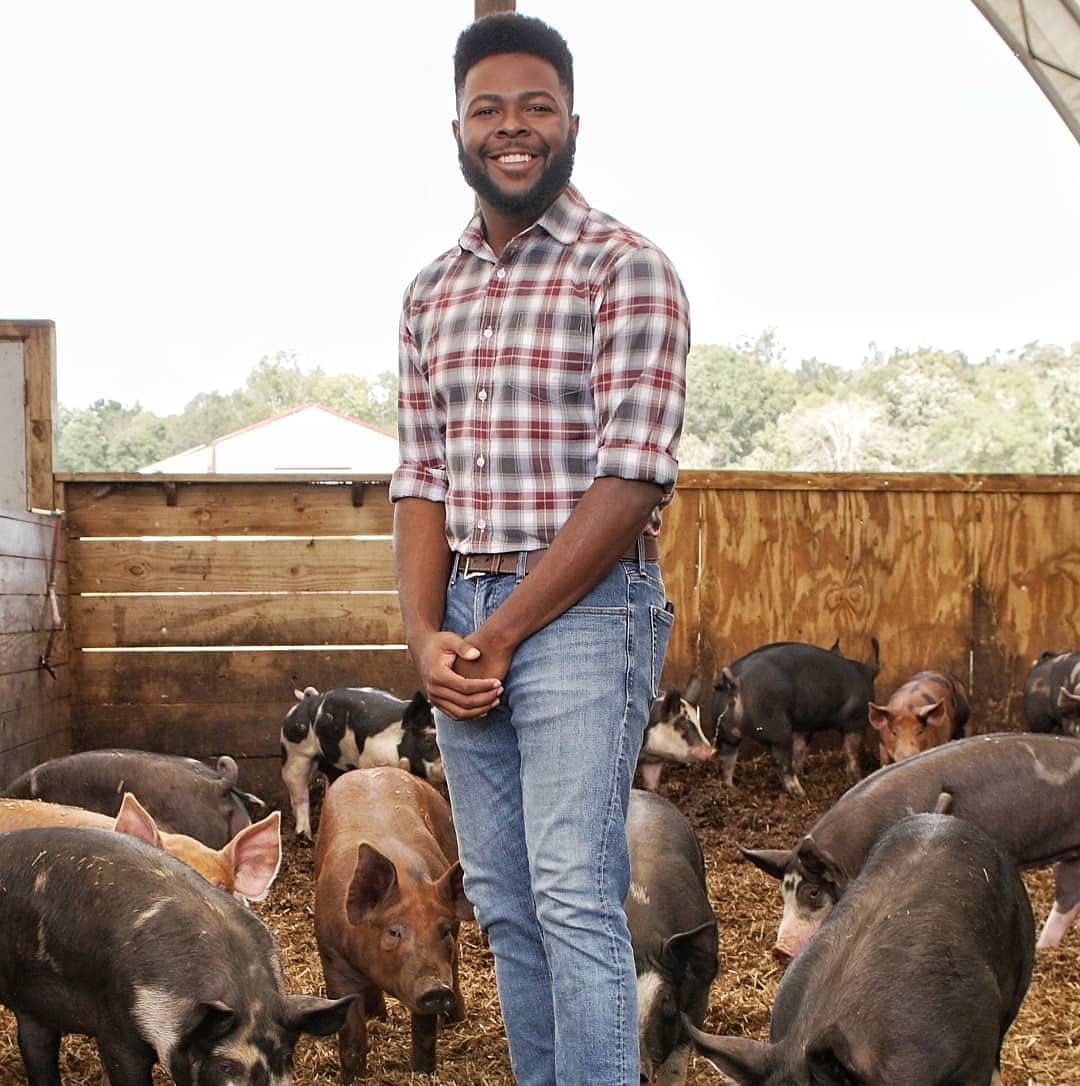by CFSA | Monday, Oct. 21, 2019 –
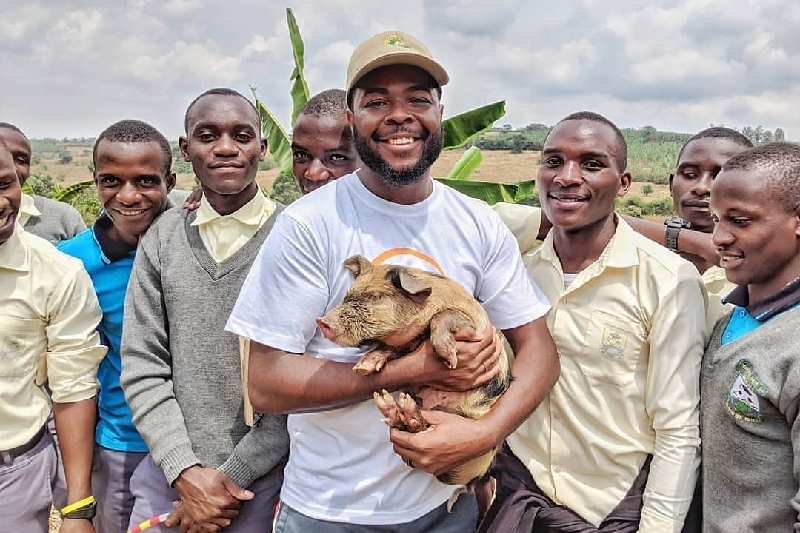
When swine specialist Rhyne Cureton first worked with pigs he found them frustrating. No matter what he tried, the pigs kept breaking out of their enclosures. It took a dramatic escape by a 500-pound sow named Louise to eventually shift Cureton’s perspective and help him develop his “farmer’s eye.”
Since that experience, Cureton (also known as “Pork” Rhyne) has become a small farms swine specialist and advocate in the United States and abroad. For the last three years, Cureton has traveled to East Africa to train rural pig farmers on how proper livestock husbandry and health correlate to farm profitability.
We recently caught up with Cureton to talk about his interest in agriculture, his experience in East Africa, and his future goals.
CFSA: What sparked your interest in agriculture and livestock production? Why pigs in particular?
Rhyne Cureton: {Laughs} How much time do we have for this interview?
I grew up really engaged in nature. I played in my backyard with bugs, lizards, and snakes—even when I was in high school. I had a fundamental understanding that animals are a part of a natural, dynamic ecosystem. Learning that from an early age gave me an appreciation for animals and nature.
I started college by studying environmentalism. As an environmental studies major, I was learning about ozone depletion, dead zones, and river contamination. When you start out from the environmental science standpoint, a lot of the references they make about agriculture refer to what agriculture is doing wrong. They tell you how agriculture is a risk to the environment.
“Agriculture is the backbone of all economics.”
What got me into agriculture was transferring to North Carolina A&T State University, which is a historically black university (HBCU) in North Carolina. While there, I learned how agriculture is a savior of the world. You can’t live without it.
Agriculture is the backbone of all economics. We can’t have goods and services without first having agriculture—something to feed your people. I realized that it’s not just farming— it’s economics. It’s not just economics—it’s policymaking, it’s research, it’s education, it’s food, it’s energy. It encompasses everything that we interact with.
I’m that person who really appreciates connecting the dots. With agriculture, it seemed like the dots were endless and the connections were just as infinite as the dots themselves. I fell in love with agriculture from that perspective.
I knew that most land-grant universities generally point their students towards careers in commercial, industrial, and big ag. For my field, that would mean working for Tyson, Cargill, Purdue, Sanderson Farms—all of these pork and poultry integrators. That didn’t resonate with my childhood experience of playing in the dirt, foraging for things, and finding animals out in their natural environment.
In my opinion, commercial agriculture really divorces animals from the land and the ecosystems. I really wanted to learn if it was possible to raise animals in a sustainable manner on land. I took a year off of school and farmed in Texas and North Carolina.
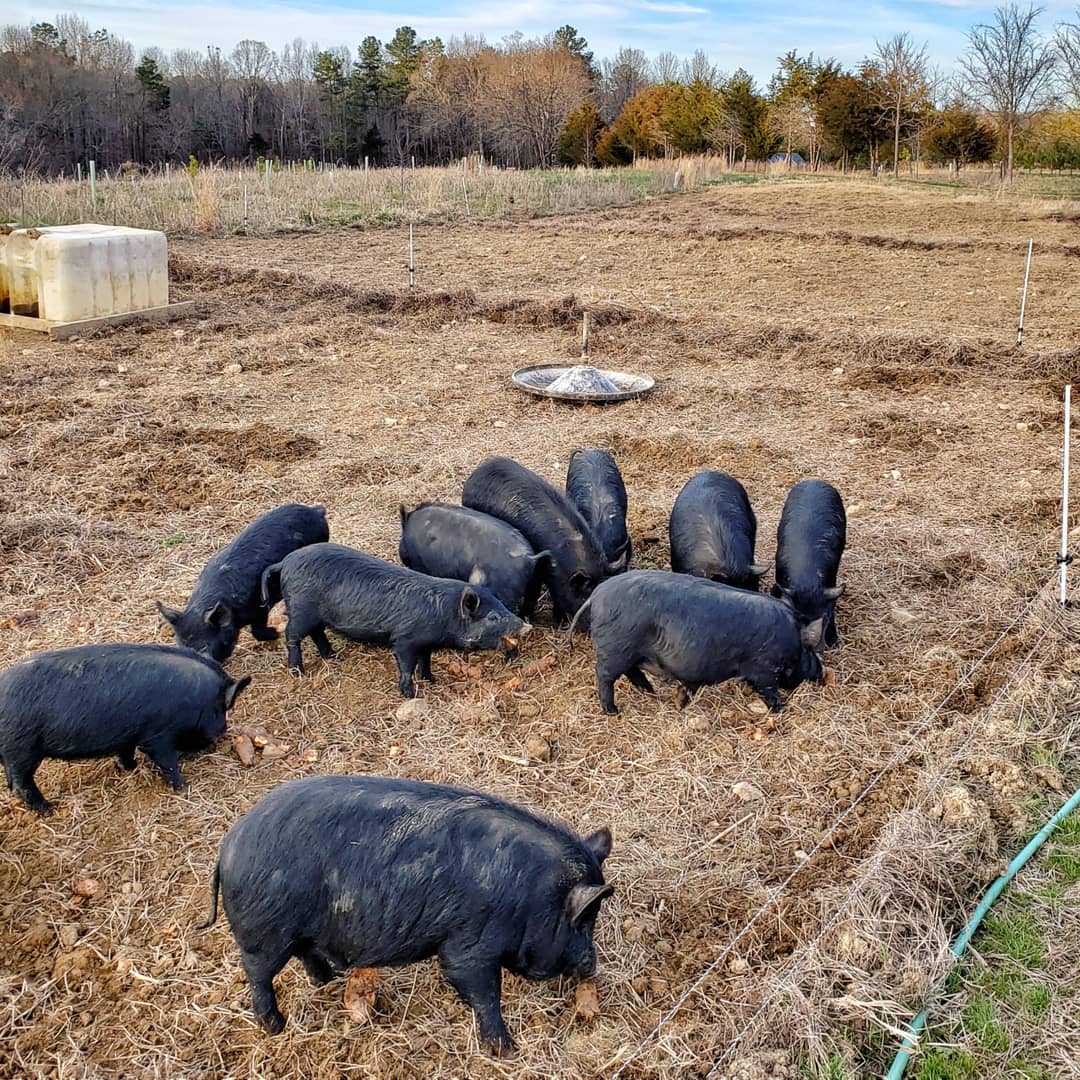
While in Texas, I worked on a farm that had livestock, including pigs. My first time raising pigs outdoors was very frustrating. I hated pigs. The farm didn’t know what to do with them. It was extremely difficult. The pigs would run out of the mesh wire fencing. They were so destructive, always breaking through infrastructure. They were a nightmare. And it was a very small number of pigs–less than 30.
The breaking point for me was with Louise, a sow around 500 pounds. Louise was breaking out of enclosures and they couldn’t contain her. I was taking the ‘day off’ when they called me back to the farm. I thought I could come to the rescue. I put Louise in the isolation pen, which had plenty of space. The pen was made of chain link fencing and one of the hinges on the side of the gate was a little loose. I put her in there thinking everything would be okay.
“Commercial agriculture really divorces animals from the land and the ecosystems.”
I walked away, checked behind my back, and wondered if she’d make a move or not. I stared at her, she stared back at me. I kept walking forward and I heard her put out this big whopping pig holler. As soon as I turned back around, she charged and lifted the chain-link gate off the hinges using only her nose and head and it flung six feet into the air. It was one of the craziest things I’ve ever seen.
Then Louise had a proud moment and trotted up to me. I got down on one knee; and no, I didn’t propose. I gently grabbed her by the jaw, and said, “Louise, I’m gonna love you so hard that I’ll be able to understand you.”
I realized that it wasn’t the pigs’ fault that I was frustrated and angry, it was my fault. I was completely clueless about how to raise a pig outdoors. And that’s where this process of humility and understanding came into place. I started developing a farmer’s eye. For me this meant getting a metal fold-up chair, sitting in the pig pasture, and watching them. That was bonding time for me and for them. It was a time where they could start to build trust with me because I was so present.
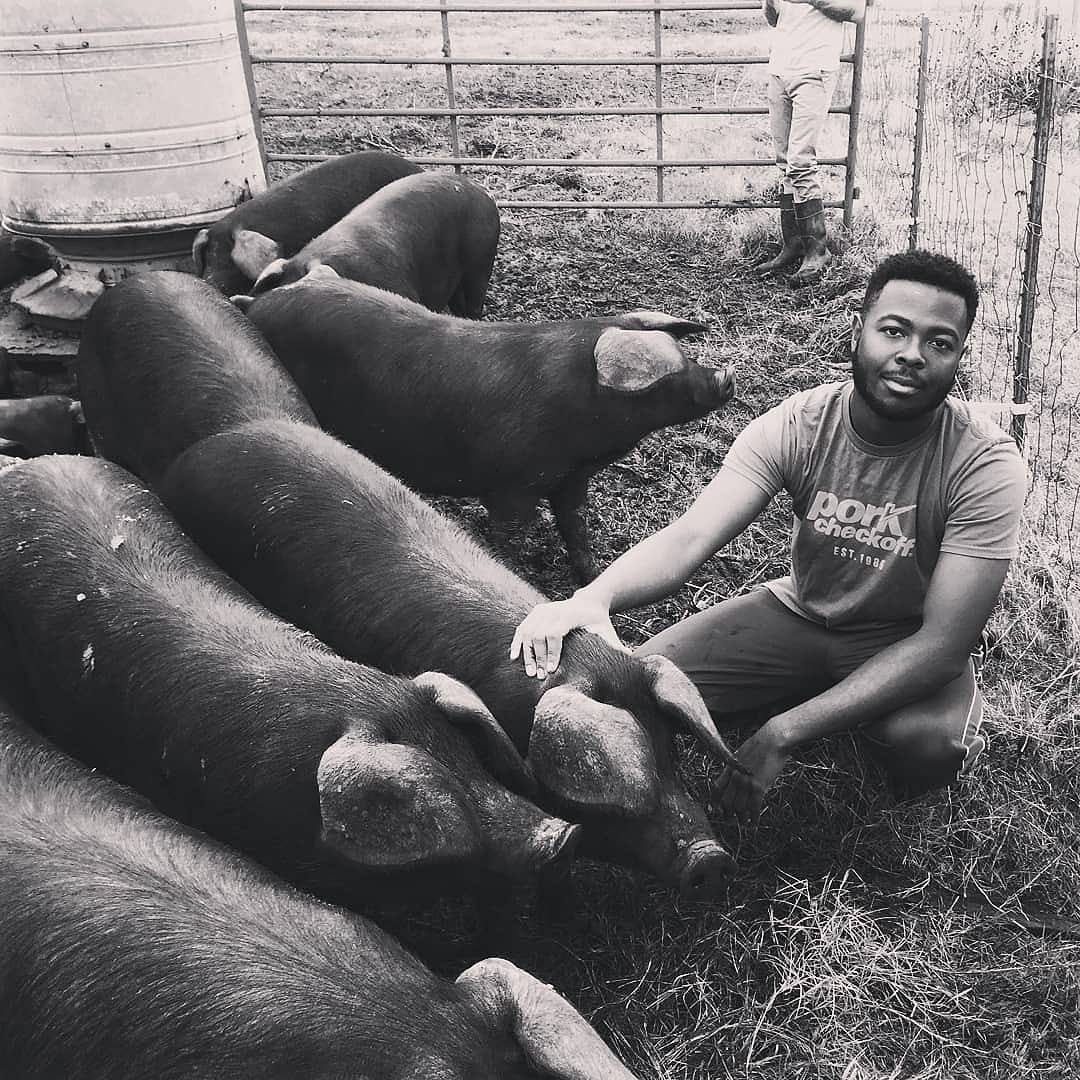
Taking the time to engage with those pigs brought the joy back into farming for me. Pigs became my favorite animal.
Around that same time, I received an opportunity to do social media work with The National Pork Board (The Pork Checkoff), a board that promotes the education, science, and marketing of pork and pig farmers within the United States. However, the board has traditionally showcased commercial farm operations.
While working for them, I realized that I wanted to create bridges of understanding between commercial operations and outdoor operations. I think that it’s possible to find understanding and common ground. I used that opportunity to really gain an understanding of the major pork industry. I thought, ‘How can I bring that information back to niche pork producers and local food? What can I learn?’
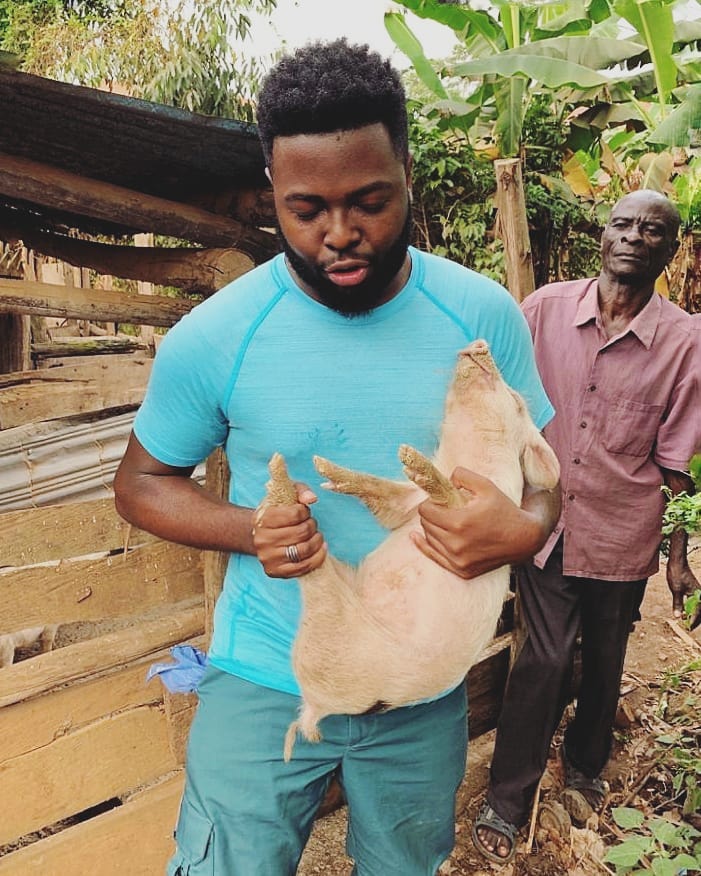
They gave me insight into why scalability, for on-farm operations and local food in general, is so important. I also learned the importance of recordkeeping and good genetics. A recordkeeping problem usually always points back to a way that you’re losing money.
Working for The Pork Checkoff allowed me to be a great advocate for niche pork producers. Working with people who were pro-conventional farming allowed me to see that our stories are not being heard and our struggles are not being heard, especially for the small livestock farmers.
CFSA: What do you find interesting for those raising pigs here in the Carolinas?
Rhyne Cureton: What fascinates me the most about pig farmers here is the variety of pigs and pig farms. North Carolina especially has such an appreciation for pigs and pork regardless of the style of operation. Although commercial pig farms have been taking a public beating, niche producers have an opportunity to showcase to the general public that the commercial model is not the only model for raising pigs. Our niche pig farmers have a very relevant place in the conversation on food and how they can play a role in providing a more traditional and artisanal approach to raising a pig for pork and lard.
CFSA: What are some takeaways from your experiences abroad that you’d like to see integrated here in the Southeast?
Rhyne Cureton: Training smallholder farms in East Africa (Uganda & Tanzania) for the past three summers has taught me that many of their issues are similar to ours when it comes to providing for a local market. Just like here, they also have to navigate through supplying to a local-based economy, finding markets and buyers who will give them a fair price, finding opportunities to create value-added products, and so on.
The most important takeaway from my time in Africa is seeing how farming is not a dead occupation. That even city folk want to farm if they can. Their culture of farming is not so far removed from its people like it is here. They understand that their market for pigs is very profitable. For example, Uganda consumes the most pork in all of Africa, yet most of it is imported. Tanzania has currently restricted the importation of meat so the country is having to source internally. These two countries have an economic environment that has created an amazing opportunity for their pig farmers to thrive once they start.
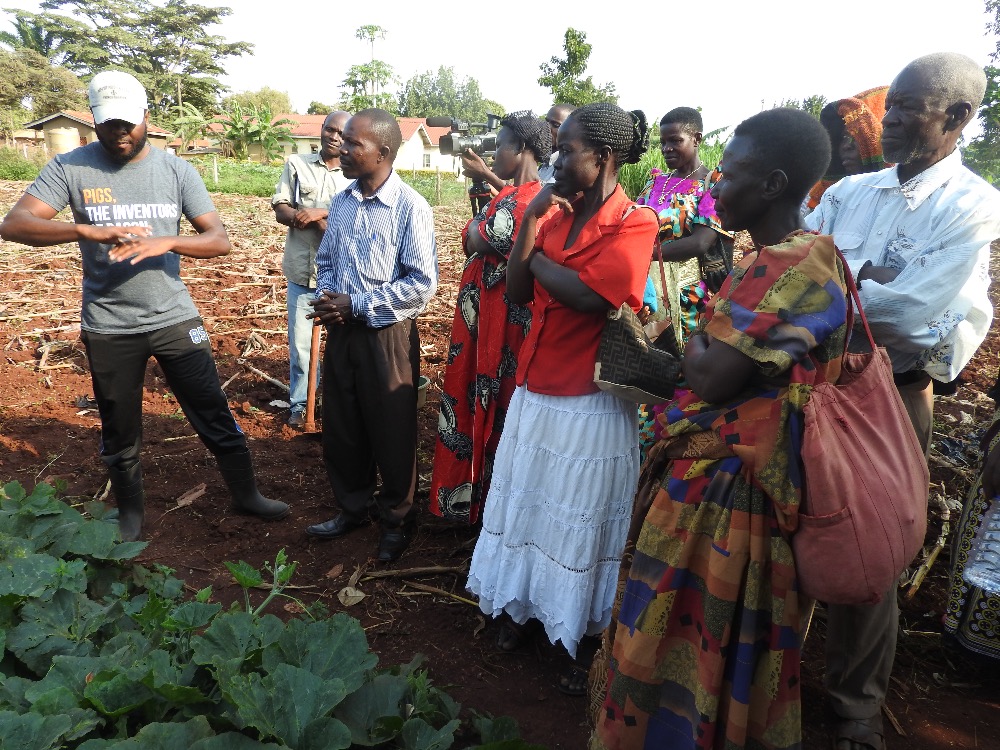
I would love for the Southeast to focus on more local sourcing of meats, including pork, even to the point of legal mandates…I know, I’m pretty crazy. However, I believe that local sourcing coupled with a whole animal utilization culture can create more demand and better prices for our farmers.
“I want the Southeast to have a revival in pursuing agriculture as a way of life in big or small ways. But in order to do that, we have to create better supply chain infrastructures; we have to create a culture that desires and buys local products.”
I want the Southeast to have a revival in pursuing agriculture as a way of life in big or small ways. But in order to do that, we have to create better supply chain infrastructures; we have to create a culture that desires and buys local products. We have to lift up those without the resources to access these products. We have to let our children experience nature regularly. We have to inspire ourselves to live lives that aren’t monotonous or simply for the sake of comfort.
Being in agriculture shows you how life isn’t perfect nor should we expect it to be; it teaches us that hardship is what builds us into resilient people, not the pursuit of comforts, pleasures, and luxuries. A lot of the issues with the local food movement in the Southeast are not based on a simple lack of interest, supply, or markets, but really a lack of value, acceptance, and experience of a life outside of serving only ourselves. We don’t need this compulsive want to control everything to our desire; to make nature, land, and even other people submissive to our will, because that mentality has been destroying our planet and our sense of community with one another.
CFSA: What advice would give to someone who’s interested in raising pigs?
Rhyne Cureton: If you really want to invest good money in raising pigs, start with two. Some people start with 20, 30, 50 pigs, and they realize it’s totally unmanageable. When you have two, it’s a trial run. You get to make your mistakes on a small-scale rather than making your mistakes with 50 pigs.
I also recommend getting to know your market. Instead of getting a certain breed of pig and hoping for the best, ask the people that you want to do business with what they’re looking for and what cuts of pig they want.
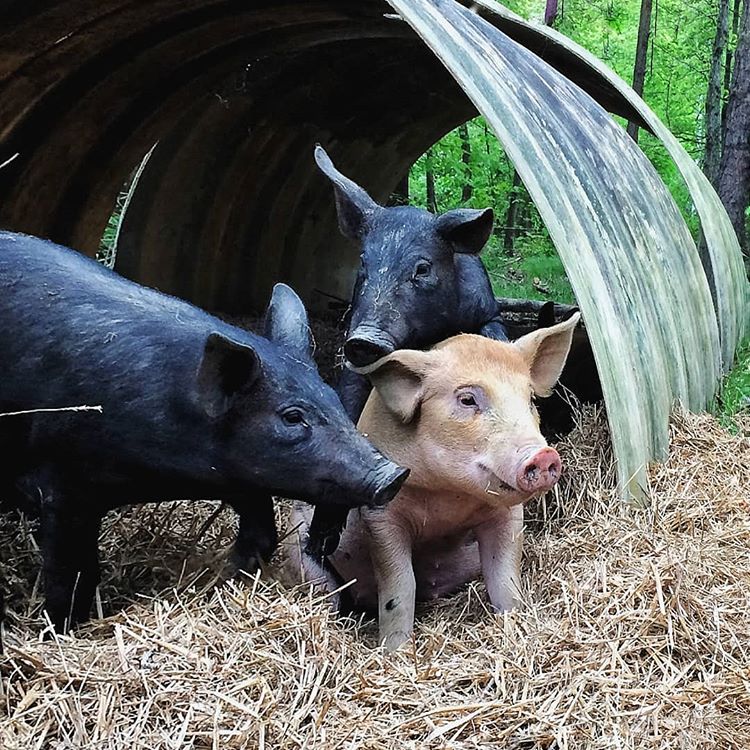
CFSA: Who or where do you go for farming advice?
Rhyne Cureton: When I was farming in Texas, I didn’t have much guidance on how to raise pigs outdoors. Joel Salatin was the initiator. He’s not my idol, but if I ever had an idol it would be him because he showed me that farming can be a lot of fun and that it’s not as complicated or as hard as we make it out to be.
Now I connect with so many different farmers through social media. I use my Instagram as a way of connecting with people from around the world.
Here are some of the farmers I follow:
- Trina Johnson: Maker’s Long Acres, Sagle, ID @makerslongacres
- Jon Jackson: Comfort Farms, Milledgeville, GA, @comfortfarms
- Nolan & Beth Warwick: Woolly Pig Pastures, Jim Falls, WI, @woolly_pig_pastures
CFSA: What are some of your future goals?
Rhyne Cureton: It’s my dream and passion to eventually own land and carry on the legacy of my forefathers. I want people to understand that no matter where they come from, no matter what skill sets they have, they can play a role in agriculture. They have a voice in agriculture, and they belong in agriculture because they feed into it.
I want to pave the way for small farmers and niche producers to have good opportunities. In Charlotte, I want to focus on how we can create more of a locally sourced food culture rather than simply having a foodie culture. Right now you see a lot of restaurants that still buy from US Foods and other commercial entities. I want it to be a different experience for these local farmers. I want people to understand that the food they’re eating comes from a farmer that’s really not that far away from them.
CFSA: With all the traveling that you do and all the conferences that you attend, what inspires you to go to the Sustainable Ag Conference?
Rhyne Cureton: I want to go because I think there’s room for improvement in terms of diversifying the pork enterprise sessions. Usually, when I look at the conference schedule, I don’t see much diversity for sessions about pork. I want to attend to be a resource for people and hopefully inspire, motivate, and encourage people to feel more confident about raising pigs.
CFSA: How can attendees get in contact and stay connected with you?
Rhyne Cureton: People can find me on Instagram (@pork.rhyne) and Facebook (Pork Rhyne). I’m always eager to answer questions!
Makin’ the Bacon: Sustaining Your Pork Enterprise
Cureton says he hopes that all farmers, regardless of their experience level, will leave with a higher appreciation for the economics behind producing, managing, and marketing their pork enterprise after attending his workshop, Makin’ the Bacon: Sustaining Your Pork Enterprise, taking place during Session D on Saturday, November 2 from 3:15–5:30 p.m.
Though his workshop will explore the dynamics of managing a pork enterprise, Cureton says, “I believe all farmers can gain further insight into how they should rethink on-farm practices and consumer outreach.”
Join Us At #CFSAC2019
Please join us at the Sustainable Agriculture Conference, Nov. 1-3, 2019 in Durham to learn, share knowledge, make valuable connections, and see old friends. Register here.
All photos courtesy of Rhyne Cureton.



